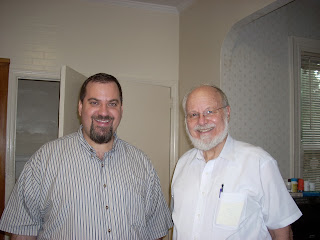Why don't the women dance?

I just spent Simchat Torah in one of the frummer neighborhoods of New York City. You know the type, every block a shtibel, an Agudah, and even the Young Israels are no longer modern. Black hats abound. There are plenty of centrist Orthodox, but they kind of blend in with the Yeshivish crowd. And in no shul do the women actually dance during hakafot on Simchat Torah. Instead, they watch the men.
I actually grew up with that model. When hakafot came around, the mechitza would be opened up so the women could watch the men dance. When I was little, I used to dance & happily wave to my mother. But even in my late teens I started doing my own thing for Simchat Torah and went to more modern neighbrhoods and more modern shuls where the women always danced. This was the first time I'd been back to my old neighborhood for ST in something like 20 years.
I didn't go to my parents' shul for hakafot - instead I went to a more modern minyan that always used to have women dancing. But that minyan isn't what it used to be. Except for one part of one hakafa when the women made a half-hearted circle on the other side of the mechitza, there was no dancing at all. I felt very uncomfortable, as if we were performing for an audience of the women.
Why don't the women dance? Is it just habit, carried over from Eastern Europe? And if so, why didn't the women dance there? I understand the dispute over whether women should carry a sefer torah while dancing - while I think there's nothing wrong with it (a sefer torah isn't mekabel tumah), there are some weak arguments against that. But dancing at all? Women dance up a storm at the frummest weddings, as long as there's a mechitza. There's certainly a mechitza in shul. And this isn't just celebrating a bride & groom, it's celebrating the Torah itself!
Is there any halachic basis in keeping the women from dancing? Is it just a strange carryover minhag? Or are the frum communities afraid that it would smack of feminism? And why don't they dance in the Young Israels and other centrist shuls that were Modern Orthodox in the 1970's and in many case still think of themselves as Modern Orthodox?
Why don't the women dance?
Cross-posted on DovBear - please leave your comments there
I actually grew up with that model. When hakafot came around, the mechitza would be opened up so the women could watch the men dance. When I was little, I used to dance & happily wave to my mother. But even in my late teens I started doing my own thing for Simchat Torah and went to more modern neighbrhoods and more modern shuls where the women always danced. This was the first time I'd been back to my old neighborhood for ST in something like 20 years.
I didn't go to my parents' shul for hakafot - instead I went to a more modern minyan that always used to have women dancing. But that minyan isn't what it used to be. Except for one part of one hakafa when the women made a half-hearted circle on the other side of the mechitza, there was no dancing at all. I felt very uncomfortable, as if we were performing for an audience of the women.
Why don't the women dance? Is it just habit, carried over from Eastern Europe? And if so, why didn't the women dance there? I understand the dispute over whether women should carry a sefer torah while dancing - while I think there's nothing wrong with it (a sefer torah isn't mekabel tumah), there are some weak arguments against that. But dancing at all? Women dance up a storm at the frummest weddings, as long as there's a mechitza. There's certainly a mechitza in shul. And this isn't just celebrating a bride & groom, it's celebrating the Torah itself!
Is there any halachic basis in keeping the women from dancing? Is it just a strange carryover minhag? Or are the frum communities afraid that it would smack of feminism? And why don't they dance in the Young Israels and other centrist shuls that were Modern Orthodox in the 1970's and in many case still think of themselves as Modern Orthodox?
Why don't the women dance?
Cross-posted on DovBear - please leave your comments there

Comments
Post a Comment